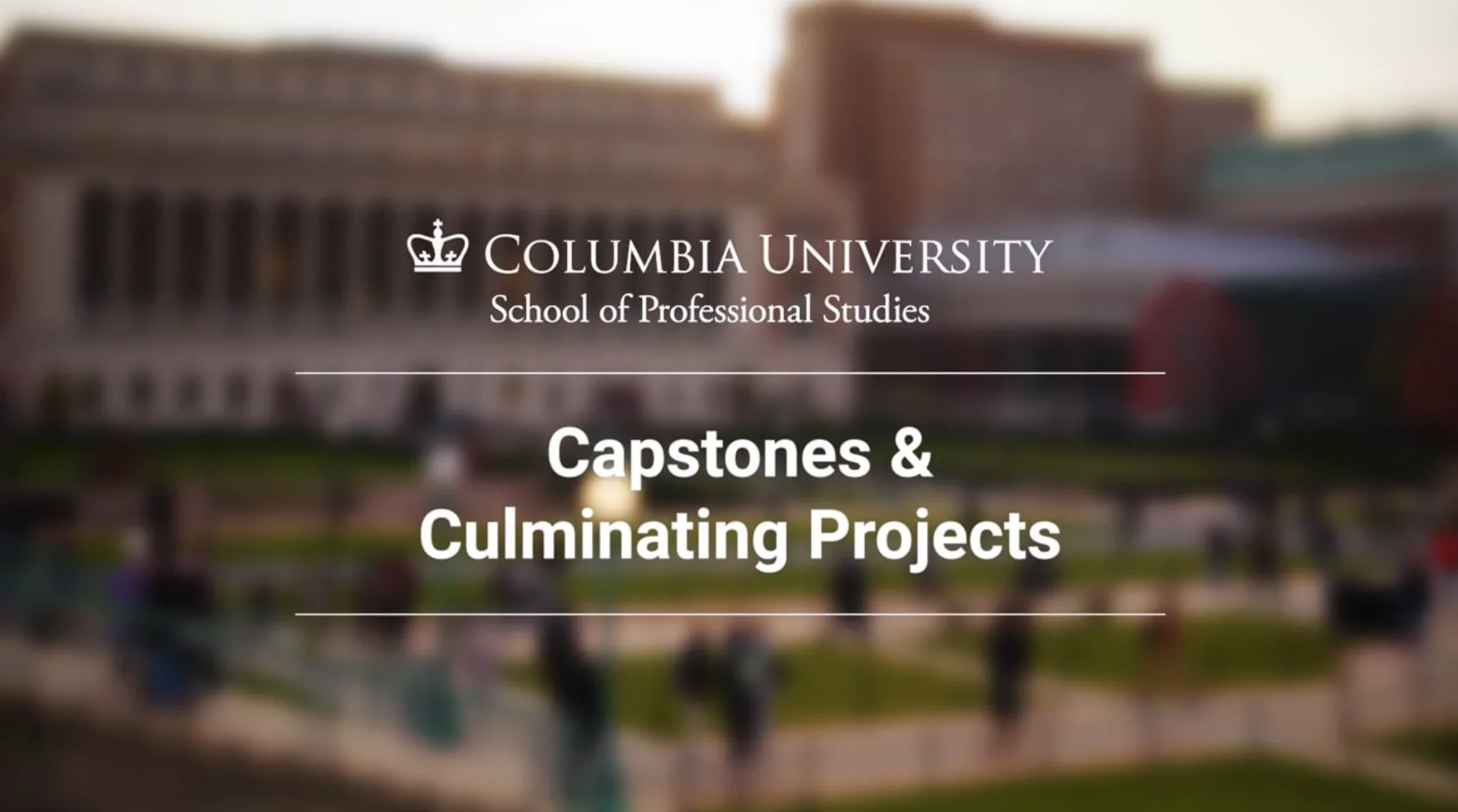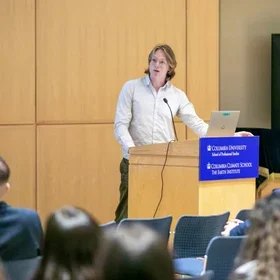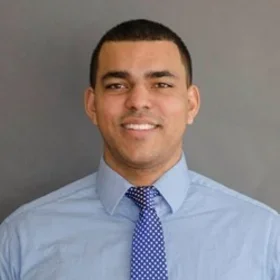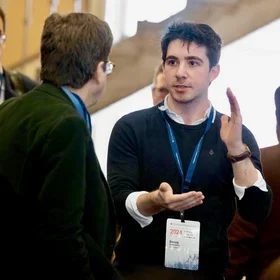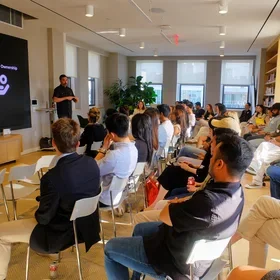Demonstrate Your Degree with Capstones and Culminating Projects
Many of the graduate programs at Columbia University School of Professional Studies (SPS) culminate in a capstone consulting project, case study, or thesis. These comprehensive projects offer students a unique opportunity to demonstrate mastery of the practical skills and analytical knowledge acquired through their studies at SPS.
Working independently or as part of a team, students ideate, research, and develop projects that address real-world challenges currently confronting clients and industries in their respective fields. They then present their methods, findings, and recommendations before faculty, students, and industry leaders, including representatives from government and nonprofits.
The Capstone’s Purpose
Capstones demonstrate that SPS students have moved from theory to practice, synthesizing the skills and insights they gained from their coursework and applying them to critical problems facing their respective industries in a professional context.
“Students’ capstone theses in the M.S. in Bioethics program provide an important opportunity for them to choose a topic that is of most interest or will be most helpful for them in the next stage of their career, and to expand their understanding of the complexities of the issues involved,” says program director Bob Klitzman.
Culminating projects often provide opportunities for students to access top-level industry executives and insiders, and students graduate from their program confident that they have acquired the necessary expertise to contribute to their organizations and grow their careers.
“Our school is really focused on meeting market demand,” says Dr. Tiffany Hughes, associate dean of graduate programs at SPS. “We prepare our students for the market by enabling them to apply their academic knowledge to solve real-world industry challenges.”
We prepare our students for the market by enabling them to apply their academic knowledge to solve real-world industry challenges. —Dr. Tiffany Hughes, associate dean of graduate programs at SPS
Types of Capstone Projects
SPS capstone projects come in a variety of formats, including fieldwork, research papers, and oral presentations. However, they all share a common goal: to challenge students to think critically, develop informed solutions to complex problems, and demonstrate mastery in their chosen profession.
This often includes consulting with and being mentored by top executives and industry professionals. For example, the Sports Management Supervised Research Projects have had NFL staff as clients; Sustainability Management students have consulted with the U.S. Environmental Protection Agency and World Wildlife Fund; and Technology Management students have worked with mentors from Goldman Sachs, HBO, Prudential, and the U.S. Securities and Exchange Commission.
Scott Miller, director of strategic communications for Columbia University Information Technology (CUIT), and his capstone team worked with Ebony magazine as he was earning his executive M.S. in Strategic Communication. “I read it as a kid, so it was exciting being able to apply my career experience to helping a publication that meant a lot to me as a Black person,” Miller shared.
Some SPS program capstones take the form of individual projects that result in research papers. For example, the capstone project for the M.S. in Negotiation and Conflict Resolution (NECR) program is a thesis that consists of students conducting a conflict analysis and literature review, designing interventions to meet the stakeholder needs from the conflict analysis, and making recommendations to sustain the changes, including expanding the network of actors. As part of their capstone, NECR students research, write, and present a 60-to-80-page thesis paper detailing proposed interventions to a conflict of their choice, which has ranged from corporate mergers to wars in Yemen and Syria, land-rights issues to police and community relations.
In recent years, Bioethics students have chosen topics in a wide range of areas for their culminating thesis, from birth and reproduction to death and dying, including organ transplantation, neurology, mental health and substance abuse, racism and marginalized groups, health insurance, climate change, and uses of AI in health care.
The Construction Administration capstone project course introduces the methods and tools necessary to analyze a set of plans and specifications for an active New York City building project and includes a comprehensive review and analysis of documentation requirements for the selected project. Working in teams, Strategic Communication students develop and propose a fully developed communication solution for a real-world business problem or opportunity, presented by a capstone sponsor organization.
Whether a real-time or simulated capstone project, intensive research paper, or thesis, the culminating project is guided every step of the way by experienced SPS faculty who encourage students to incorporate essential topics such as diversity, equity, inclusion, and accessibility into their projects and demonstrate the knowledge and skills they acquired through their SPS studies.
The Value of the Capstone
The utility of capstones extends beyond a student’s academic tenure at Columbia. Often, students apply elements of their capstone projects in future work and research, and find value in their culminating projects in job interviews, conferences, writing samples, and published works.
“Whether students are interviewing for new positions, looking to be promoted in their current workplace, or looking to pivot,” says Dr. Hughes, “they’ll be able to leverage this project to showcase their experiences and knowledge, helping them to achieve their career goals.
“I’ve seen many students secure jobs with the companies they’re collaborating with on their capstone projects,” adds Dr. Hughes. “So I see this capstone initiative as such a tangible example of our school’s direct connection to industry. We’re working each day with our industry partners to address their challenges. And by doing so, we’re preparing our students to lead and solve real-world problems in their fields.”
About the School of Professional Studies
The Columbia University School of Professional Studies (SPS) was founded in 2002 with a mission to provide innovative—and flexible—programs that help students reach their educational and professional goals. The School offers 18 accredited master’s degrees, 15 certificate and certification programs, and more than 100 areas of study through its Postbaccalaureate Studies and Visiting Students programs—all available on a part-time basis. Explore Columbia SPS’s part-time offerings, including master’s degrees, certificates, and other non-degree programs. To view recent SPS student work, visit the SPS Capstone and Culminating Projects page.
